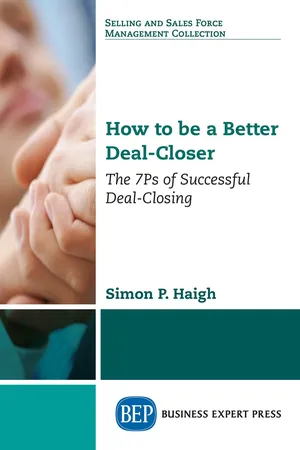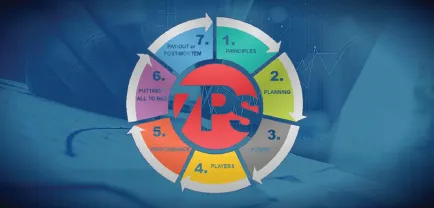![]()
CHAPTER 1
Principles
Lack of direction, not lack of time, is the problem.
—Author and motivational speaker, Zig Ziglar
This chapter covers some of the fundamentals of deal-closing before we turn to the process detail in later chapters.
Create a Clear and Simple Strategy and Do Not Rush It
Business is unpredictable, not least as macro- and micro-economic factors are always changing. Deal-closing in business is even more unpredictable, as it has its own particular set of obstacles, difficulties, and surprises that invariably arise. Ego, dubious business ethics, corrupt practices, a “head in the sand” mentality, anger, greed, and so on, add extra layers of uncertainty to the business mix. And with ever more onerous governance, compliance, taxation, legal, accounting, environmental, and corporate social responsibility factors also needing to be understood and factored into a successful deal pathway, the deal landscape soon becomes complicated.
Many things can go wrong in a deal-closing journey, such as derailing tactics from the other side, unhelpful egos amongst the stakeholders, internal or external blockages or simply that the business environment changes during the deal-closing process. Following a clear strategy, using in-depth planning, engaging the right people, ensuring stringent and exacting execution, experience, intuition, good communication skills, empathy, persistence, and constantly monitoring are all essential ingredients for ensuring successful deal-closing. You also need to be flexible and to learn from successes and mistakes in prior deals.
I have found that every deal is comprised, to a greater or lesser extent, of the same underlying principles and directions. Good deal-closers engage certain skills and techniques that maximize the chances of deal-closing success. Good deal-closers know how to play the “deal game.”
Certainly, from a corporate perspective, having a clear business strategic intent for the deal in question and communicating it openly to staff is essential for obtaining their “buy-in,” which in turn helps with executing the deal.
The Blocked Technology Deals
When I was a commercial lawyer for a U.S. technology multinational, twice I was tasked with handling two major technology supply deals with separate world-renowned European technology companies. Both deals had been blocked for many months.
It soon became clear to me that there was an effective stand-off between the U.S. legal team and the European based clients on each side. My investigations unravelled various reasons for this ranging from ego clashes, to cultural differences, differences of opinion and an element of deal lethargy had set in.
Have you experienced this?
What did you do?
What did I do?
To counter this, I developed a clear resolution strategy, ensured communication was as open as possible and kept an open-mind as to moving matters on.
https://expertdealcloser.com
Deal-Closing Is Broader than Selling or Negotiating
Both good selling and negotiating skills are essential components of the successful deal-closer’s armory, and exist alongside other skills and techniques that a good deal-closer can call upon.
Everyone lives by selling something.
—Author, Robert Louis Stevenson
Farlex’s Free Dictionary (www.thefreedictionary.com) defines selling as:
Exchanging or delivering for money or its equivalent.
Sales are the life-blood of business, driving growth, market share, and shareholder support. Selling requires skills of persuasion, which we all have in us to varying degrees from the very earliest of ages. Selling is essentially the act of persuading the other side to provide you with what you want. Remember stamping your feet to get what you wanted as a young child? Persuading, convincing and, therefore, selling are some of the most natural, familiar, and oldest of all human skills.
An accomplished salesperson can navigate the inevitable differences in objectives, drivers, viewpoints, prejudices, and even cultural differences between themselves and their customers. That said, ever-lurking to counter our innate skills of persuasion are the equally powerful human emotions and states of ego, anger, greed, ignorance and self-centeredness, any of which individually or collectively can, at any time, derail a deal. There are, however, as you will see, a number of mechanisms a good deal-closer can use to minimize these very basic, yet powerful, human factors.
Sustainable selling is not a quick fix, scatter-gun exercise. It is about empathy, doing your homework, identifying where you can help and how you can contribute. It is about listening, identifying and tracking the market and your customer needs. It is about being a valuable partner—being useful (rather than being another cost), even if that initially means saying no.
We recommend the following seven Ps for Sustainable Selling:
Plan
Understand your target audience and the problem it needs solving. Plan and research demographics, sectors, gender, age, location factors, etc., and regularly track the market. You also need to ensure you are reaching out to the right person (usually the one who holds the budget).
Pitch
Leverage first impressions. You need to show you know what you are talking about. Grab your potential customer’s attention, ideally through a captivating one-liner. Use humor, if appropriate, to get attention.
Provide Value
Show that you believe in your offering. Also show that you are understanding of your customer’s needs through your value proposition—the reason they should buy from you.
Personalize
Personalize your message and ensure the relevance of your unique selling proposition. Engage with your customer on an authentic, empathic level. Once you have established attention through trust you are more likely to get that all-important first meeting.
Problem-solve
Provide a tailored solution to a known need or problem of your customer through your offering. You need to have something your customer does not have and wants and/or needs. This helps trust to develop, which in turn makes it easier for customers to return and repurchase. Review and evaluate what is working and change what is not. You can use the SPIN Sales Model:
(a) Situation: ask the buyer to tell you what facts they need addressing;
(b) Problem: ask the buyer to tell you what pain they are suffering;
(c) Implied Needs: ask the buyer to explain the effects of the problem then propose solution(s); and
(d) Explicit Needs Pay-off: ask the buyer to tell you about their explicit needs and then ask them to explain the benefits your solution(s) offer.
Pursue
Think close, close close. Chase the lead within a week, otherwise you risk losing it. Always ensure meaningful activity in your sales funnel. Don’t let leads dry up. Follow up every meeting. You will lose 100 percent of opportunities if you don’t ask for them.
Persevere
Do not give up. Brush off rejection. Stay focused on the goal and look after yourself physically and mentally.
In sales, the seller’s unique selling value proposition—the thing (whatever it may be) that differentiates the opportunity in the other side’s mind from an alternative—is the key reason why the other party gives the deal-closer what he or she wants. Value propositions are a very powerful tool of persuasion. A value proposition is a definitive statement that promises, from your proposal, the delivery of value to the other side. The more specific the value proposition is the better, not least as it demonstrates to the other party that you understand what they need and/or want. More importantly, it indicates that you recognize that the deal is not just about you.
The Cambridge Dictionary Online (dictionary.cambridge.org) defines negotiating as:
To have formal discussions with someone in order to reach an agreement with them.
Note that there is no reference to money in this definition.
Negotiating is different from selling, in that negotiating requires the act of giving to receive and, in the process, it accommodates the parties’ differences to facilitate an agreement.
Selling is about you establishing a need or desire in the potential buyer for what you are offering. It is then about overcoming differences through persuading the other party of the value of the service or product that you are offering. Unlike selling, negotiation necessarily requires the deal-closer to make concessions. That said, good deal-closers are able to negotiate the deal with minimal compromise.
The ability to negotiate successfully requires honed interpersonal skills for maximum success. With these skills, an accomplished negotiator can confidently ask for the outcome he or she is looking for, provided of course it is within reasonably achievable parameters. Armed with the skills of an accomplished negotiator, and provided you communicate in an effective, meaningful, and authentic way, you should not be afraid to ask for what you want in a deal. In fact, you’ll be quite surprised at what you can successfully negotiate.
The types of negotiation you can use in a deal depend on the level of trust, complexity, and intention at play. Negotiations can range from:
• Simple hustling/haggling and/or using trade-off tactics, where the main point is to get the best price you can as quickly as possible and where there is little chance of an ongoing relationship of trust. While normally associated with more complex negotiations that involve hustling or haggling, a tactic of using trade-offs to leverage negotiation results is a tactic that can be employed, and can have the appearance of a softer form of haggling. Trade-offs allow deal parties to potentially achieve more than through a simple fixed-pie mentality compromise.
Trade-offs replace simple “Yes” or “No” attitudes by allowing for emerging flexibility through an “I’ll agree to that if you accept this important issue for me” attitude. This tactic can be made easier if multiple issues are open for discussion and an iterative process is in place to determine what is or is not of importance to each side at the same time.
• One-off trading.
• An ongoing working relationship, such as in the case of joint ventures or collaborations, where trust is critically important, as both parties need to work together over a long period of time. Usually, the complexity of the deal increases in line with the level of trust—and vice versa.
In an ongoing working relationship scenario, it is important to maintain a sustainable relationship while also keeping an eye on the challenges that may lie ahead. Rather than simply focusing on the deal itself, it is important to (a) keep one eye on the future as much as the short-medium term; (b) get to kn...

